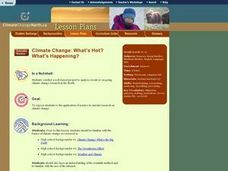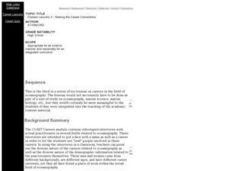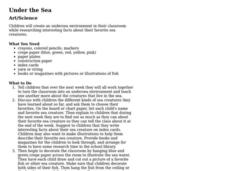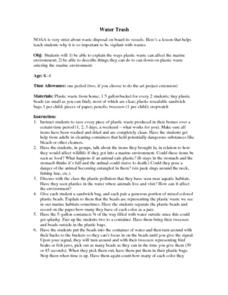Curated OER
Sea World Fieldtrip Follow-up
Students create a graphic organizer in preparation for a web page about a specific science-related topic. This lesson is used as a follow-up to a field trip experience and can be adapted for many different subjects.
Curated OER
Climate Change: What's Hot? What's Happening?
Students conduct a web-based project to analyze recent or on-going climate change research in the North. They are exposed to the application of science in current research on climate change.
Curated OER
History and Oceanography
Students identify the accomplishments in oceanography from 17th-19th century, construct a time line with the scientists in chronological order, and discuss the parallels of oceanographic contributions with those in other areas of science...
Curated OER
Rescuing a Beluga Whale
Students research particular characteristics of the Beluga whale as it applies to the role in each student is assigned. Students work cooperatively to design a proposal for a new home for the baby Beluga. Students present their proposal...
Curated OER
Oceanography Research
Fifth graders locate information on a specific ocean animal using encyclopedias, nonfiction books, SIRS Discoverer, multimedia encyclopedias, and the Internet. They create an acrostic poem about the ocean animal they have been researching.
Curated OER
Sea Secrets
Young scholars study the following: For centuries, people have been challenged by the mysteries that lie beneath the blue depths of our ocean planet. Very little was known about the ocean until late in the nineteenth century, although...
Curated OER
The Magic School Bus Goes to Mussel Beach
Students participate in a hands-on activity where they explore tidal zones. They explore tides and marine life. This is an experiment that can be accomplished in class.
Curated OER
Natural Inquirer
Students interview wildlife experts to gain information needed to research and write a report about an aquatic plant or animal affected by climate change.
Curated OER
Science: Making Career Connections
Students explore careers in oceanography. They compare and contrast requirements for careers in the field, and determine what high school courses would help to prepare them. Finally, they create a computer-based project related to...
Curated OER
Under the Sea
Young scholars create an undersea environment in their classroom while researching interesting facts about their favorite sea creatures. They create illustrations to decorate their classroom and transform it into an undersea environment.
Curated OER
2005 Hidden Ocean Expedition What's Eating You?
Analyze data and make inferences about the trophic position of organisms in the Canada marine food web. After a review of the geography and formula, discuss results and write an essay to improve the understanding of Artic food webs.
Curated OER
Leaving Home
Students explain the importance of larval dispersal and retention to populations. They collect data on organisms and examine it.
Curated OER
A Rainbow Under the Sea: How Do Animals Survive in the Ocean?
Second graders, with adult help, create a PowerPoint presentation on a selected ocean animal.
Curated OER
Researching the World's Oceans
Students research and compare important features of the oceans based on current data. They examine the globe or map, determine the major oceans of the world, and record their names on the data sheet.
Curated OER
Marine Communities
Young scholars view a video and then complete lab exercises to help them explain marine communities and animals in them.
Curated OER
Water Quality and Temperature
Students are led through three activities to explore the effect of temperature fluctuations on the growth and survival of aquatic plants, clams, and shrimp eggs.
Curated OER
Water Trash
Students explain the ways plastic waste can affect the marine environment. They are able to describe things they can do to can down on plastic waste entering the marine environment.
Curated OER
Seashore Limitations
Young scholars demonstrate the movements and behaviors of creatures from different parts of the ocean.
Curated OER
Organize Ocean Animal Research
Sixth graders research a variety of ocean animals, organizing the facts in the form of a database. They input the results of the research into the appropriate field of their database for their Oceanography Science Unit.
Curated OER
Those Amazing Seaworld Animals
Young scholars research the animals at SeaWorld and then relate the info they have found into various types of graphs; line, circle and bar. This lesson combines math and science nicely. They access a website imbedded in this plan to do...
Curated OER
Brine Shrimp
Students gain a sense of the delicacy and complexity of a living organism and the rather narrow range of conditions under which it can live.
Curated OER
Creative Writing - I AM A FISH
Ninth graders write a letter to the editor about the impact of people on marine life from the point of view of a fish.
Curated OER
Create an Underwater Scene
Young scholars apply knowledge of underwater ocean life by creating an ocean life scene with marine animals and plants placed at appropriate ocean depths.
PBS
Pbs Learning Media: Sea Creatures
This video segment from Nature features various sea creatures. [5:52]

























